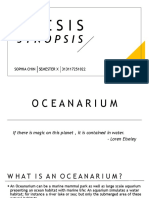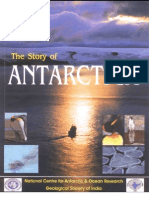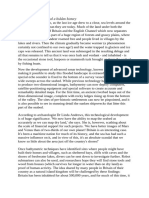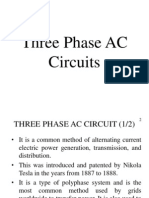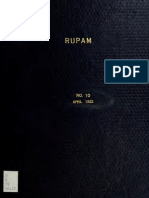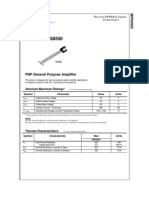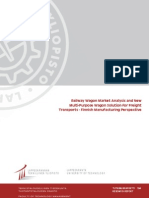Life Long Learning
Life Long Learning
Uploaded by
Hartford CourantCopyright:
Available Formats
Life Long Learning
Life Long Learning
Uploaded by
Hartford CourantOriginal Description:
Copyright
Available Formats
Share this document
Did you find this document useful?
Is this content inappropriate?
Copyright:
Available Formats
Life Long Learning
Life Long Learning
Uploaded by
Hartford CourantCopyright:
Available Formats
Science NIE ACTIVITY Science Matters!
is a series presented in
collaboration with the Connecticut Academy of
MATTERS!
Science and Engineering and the
The Discovery Museum.
For more information, visit www.ctcase.org
… IN CONNECTICUT or call 860.571-7143.
Getting into the Habit of Life-long Learning
Sandra Justin, PhD
Science Teacher (retired) and Consultant
The landing area was covered in rock with patches of snow extending from the overhang 50 feet
WORDS TO KNOW
from the waters edge. Curious penguins watched as I waded through the ankle deep water and
stepped onto the beach. Here I am, I thought. I finally did it. I’m on my 7th continent – Antarctica. Algae – Algae are organisms that are very important because they
make much of Earth’s oxygen. Some algae, such as seaweed, look like
I had read firsthand accounts, seen documentaries and attended presentations. All of that knowledge plants. However, algae are actually neither plants nor animals. Instead
did not prepare me for this experience. Three days of rough water while crossing the Drake
Passage was in the past, Antarctica was to be
they belong to a group of living things called protists.
my playground for the next 10 days. Lichen – a type of small plant that grows on rocks and walls
Most of the days were cloudy with a constant Moss – a small flowerless green plant that lacks true roots, growing in
wind. February is summer in Antarctica, so low carpets or rounded cushions
temperatures were between 32° – 40° F. I
saw thousands of molting penguins, sea birds Moai – Giant stone statues on Easter Island, which is located
scavenging for food and seals lying on rocks approximately 2,180 miles west of continental Chile
or patches of snow. What surprised me was Pedagogy – Refers to the art and science of teaching and learning
the plant life. I did not know that plants grew
in Antarctica. There were lichens, moss and
algae in beautiful shades of orange, yellow,
red and green. They were hard to the touch and smooth, not soft and lush like the mosses found
in New England.
I discovered a long time ago that I learn best by doing. I get experience through travel and by taking
courses. As with Antarctica, photos cannot compare to seeing the Eiffel Tower, the Taj Mahal or the
Great Pyramid of Giza in person. I wanted to see the Moai, the giant stone heads on Easter Island,
so I took a side-trip on my way to Antarctica.
The same was true for my education. Over 30 years, I have taken a wide assortment of courses, Algae
everything from ‘The Glacial History of New England,” to “Fundamentals of Acting.” When colleagues
would ask “Why,” I would answer, “Why not?” Why not continue to learn new things; why not be
challenged and why not get out of your comfort zone?
SKILLS + KNOWLEDGE
I am an educator. I have taught middle school science, pedagogy and content to K – 12
science teachers, and graduate courses at the university level. I have four advanced degrees
(Science in Education, Liberal Studies, 6th Year in Administration and Supervision, and a PhD
in Curriculum and Instruction). Teaching is more than the passing on of information. What
is important is the experience behind that knowledge and the skill to translate it into a form
understood and absorbed by the learner, regardless of age. Learning has to be active and
interactive.
MEET THE SCIENTIST Moss
One afternoon I borrowed microscopes for my fifth grade class. I wanted my students to Lichen
look at ordinary objects, such as hair, yarn and insect wings. When I saw how excited and Sites to Visit
engaged they became, it changed the way I taught science. I always liked science, but now AntarcticaFacts about the Antarctic Continent, including its explorers, animals and climate.
I love it!
There are also fun activities to do.
http://atozkidsstuff.com/anart.html#
http://coolantarctica.com/
Easter Island
http://www.sciencekids.co.nz/sciencefacts/earth/easterisland.html
History and activities for students
Connecticut State Department of Education (CSDE): Science Framework
• Scientific inquiry is a thoughtful and coordinated attempt to
search out, describe, explain and predict natural phenomena.
• Scientific inquiry progresses through a continuous process of
questioning, data collection, analysis and interpretation.
43715-01
You might also like
- Dune God Emperor PDFDocument3 pagesDune God Emperor PDFBecky0% (3)
- Floating and Sinking Science Lesson PlanDocument3 pagesFloating and Sinking Science Lesson Planapi-487744424100% (1)
- NomadlandDocument5 pagesNomadlandAllison44% (16)
- Nov. 15 2021 Recusal ListDocument3 pagesNov. 15 2021 Recusal ListHartford CourantNo ratings yet
- 13 - Chapter 5 CFD Modeling and Simulation - 2Document28 pages13 - Chapter 5 CFD Modeling and Simulation - 2Zahid MaqboolNo ratings yet
- Emergency PreparednessDocument46 pagesEmergency PreparednessBosh Cosh TrainingsNo ratings yet
- Brand Equity ModelDocument86 pagesBrand Equity ModelYash Vora100% (1)
- Geometric Geodesy B (2010)Document212 pagesGeometric Geodesy B (2010)Ms Rain100% (1)
- LionfishDocument1 pageLionfishHartford CourantNo ratings yet
- Ev NautilusDocument1 pageEv NautilusHartford CourantNo ratings yet
- PaleontologyDocument1 pagePaleontologyHartford CourantNo ratings yet
- Childen Create Own Museum Jan 19 2024Document10 pagesChilden Create Own Museum Jan 19 2024Yasotha KanesanNo ratings yet
- Dinosaur Fossils: Dinosaur Fossils: Not Just Bones Not Just BonesDocument1 pageDinosaur Fossils: Dinosaur Fossils: Not Just Bones Not Just BonesHartford CourantNo ratings yet
- Primitive TechDocument1 pagePrimitive TechHartford CourantNo ratings yet
- Marine GeologyDocument1 pageMarine GeologyHartford CourantNo ratings yet
- Striped Bass SkeletonDocument3 pagesStriped Bass SkeletonKatie BrooksNo ratings yet
- New Scientist - September 28, 2024 USADocument52 pagesNew Scientist - September 28, 2024 USAedgtanz4No ratings yet
- Presentation 1Document20 pagesPresentation 1Sophia ChinNo ratings yet
- Research Into ResearchDocument2 pagesResearch Into ResearchRoseywhite LaraNo ratings yet
- Lesson 1 Intellectual Revolutions That Defined SocietyDocument5 pagesLesson 1 Intellectual Revolutions That Defined Societyotherpurposes496No ratings yet
- English ASL ProjectDocument12 pagesEnglish ASL ProjectMedhansh GargNo ratings yet
- The Smell of Marsh Mud: Matagorda Island National Wildlife RefugeDocument3 pagesThe Smell of Marsh Mud: Matagorda Island National Wildlife RefugeRYIESENo ratings yet
- SCIENCE PLANNING TEMPLATE - Part 1: Learning Outcomes PlanDocument5 pagesSCIENCE PLANNING TEMPLATE - Part 1: Learning Outcomes PlanMARIA DEL CARMEN ALVARADO ACEVEDONo ratings yet
- West Coast FossilsDocument4 pagesWest Coast Fossilsapi-337712799No ratings yet
- 7759 Cad-27Document7 pages7759 Cad-27Navi SinghNo ratings yet
- Science Day SpeechDocument1 pageScience Day Speechsovow33568No ratings yet
- STEM Level 1 - California Academy of Sciences Field TripDocument4 pagesSTEM Level 1 - California Academy of Sciences Field TripEmma C2531-STUNo ratings yet
- Walking Sideways: The Remarkable World of CrabsFrom EverandWalking Sideways: The Remarkable World of CrabsRating: 4 out of 5 stars4/5 (4)
- Ghose 2014 Museum - InternationalDocument8 pagesGhose 2014 Museum - InternationalpolianamsjNo ratings yet
- Thesis Statement On Sea TurtlesDocument4 pagesThesis Statement On Sea Turtlesdwsmpe2q100% (2)
- ScienceDocument1 pageScienceHartford CourantNo ratings yet
- Stem Response - 17 NovemberDocument3 pagesStem Response - 17 Novemberapi-665213535No ratings yet
- Pearl Fishing in The Pandya CoastDocument324 pagesPearl Fishing in The Pandya CoastGokul KrishnanNo ratings yet
- News 3Document19 pagesNews 3hoanghuong2822005No ratings yet
- Story of AntarcticaDocument65 pagesStory of AntarcticaNathanian100% (1)
- New Scientist - July 15, 2023 USADocument52 pagesNew Scientist - July 15, 2023 USAPetrNo ratings yet
- Seton Watch: Background InformationDocument12 pagesSeton Watch: Background InformationSebastián Alejandro BalbiNo ratings yet
- SCRIPTDocument3 pagesSCRIPTelleveradwaynejamesNo ratings yet
- Hubble Space Telescope: Scooper Bowl XVIDocument7 pagesHubble Space Telescope: Scooper Bowl XVIAnn HellerNo ratings yet
- OS10VIC Chapter7 Teaching ProgramDocument20 pagesOS10VIC Chapter7 Teaching Programsamiao90No ratings yet
- Reading PassageDocument6 pagesReading PassageHoang Huy NguyenNo ratings yet
- Touchstones for Deterritorializing Socioecological Learning: The Anthropocene, Posthumanism and Common Worlds as Creative Milieux Amy Cutter-Mackenzie-Knowles 2024 scribd downloadDocument55 pagesTouchstones for Deterritorializing Socioecological Learning: The Anthropocene, Posthumanism and Common Worlds as Creative Milieux Amy Cutter-Mackenzie-Knowles 2024 scribd downloadfrojshilaryNo ratings yet
- Premio Traduzione Harpers CollinsDocument8 pagesPremio Traduzione Harpers CollinsSilvia RomanoNo ratings yet
- Sea Cucumber ThesisDocument7 pagesSea Cucumber Thesisrqopqlvcf100% (2)
- 700 Science Experiments For Everyone: Compiled by UnescoDocument113 pages700 Science Experiments For Everyone: Compiled by UnescoMohit SinghNo ratings yet
- The Amazing Work of Scientists with Max Axiom, Super ScientistFrom EverandThe Amazing Work of Scientists with Max Axiom, Super ScientistNo ratings yet
- What Is Science PDFDocument22 pagesWhat Is Science PDFritvikr100% (1)
- What Is Science PDFDocument22 pagesWhat Is Science PDFJames HollomanNo ratings yet
- ScienceDocument22 pagesSciencejolinaNo ratings yet
- Stink Teachers' Guide: Stinktacular ScienceDocument7 pagesStink Teachers' Guide: Stinktacular ScienceCandlewick PressNo ratings yet
- Virtual Science Fieldtrip Reflection PaperDocument5 pagesVirtual Science Fieldtrip Reflection Paperapi-316278090No ratings yet
- IU28 Antarctica PDFDocument17 pagesIU28 Antarctica PDFDina Amelia AlbyNo ratings yet
- Continental Drift and Seafloor Spreading: Sci-BoxDocument26 pagesContinental Drift and Seafloor Spreading: Sci-BoxNhet Ytienza100% (3)
- Ttoc Lesson IdeasDocument7 pagesTtoc Lesson Ideasapi-502870543No ratings yet
- TMP AC17Document2 pagesTMP AC17FrontiersNo ratings yet
- Sea El RefDocument2 pagesSea El Refapi-651962220No ratings yet
- CAE Test 14Document6 pagesCAE Test 14thao20040901No ratings yet
- Not Your MamaDocument2 pagesNot Your Mamaapi-237677548No ratings yet
- Encyclopedia of IslandsDocument1 pageEncyclopedia of IslandsLUTHFAN ALIFI ANWARNo ratings yet
- CH 5Document9 pagesCH 5deorakritirajNo ratings yet
- STEM - Summercamp2019 Flyer EnglishFinalDocument1 pageSTEM - Summercamp2019 Flyer EnglishFinalDee NotoNo ratings yet
- Crocodile Research PaperDocument6 pagesCrocodile Research Papereghkq0wf100% (3)
- Silvia Dotta Federal University of ABC, Santo André, SP, Brazil - Silvia - Dotta@Document1 pageSilvia Dotta Federal University of ABC, Santo André, SP, Brazil - Silvia - Dotta@Silvia DottaNo ratings yet
- Lafferty V Jones Pattis Show Cause Hearing 8-17-22 Actual ExhibitsDocument9 pagesLafferty V Jones Pattis Show Cause Hearing 8-17-22 Actual ExhibitsHartford CourantNo ratings yet
- Hurley Employment Agreement - Final ExecutionDocument22 pagesHurley Employment Agreement - Final ExecutionEditor, Hartford CourantNo ratings yet
- NIE Art History Bruce April 2021 Proof 3Document1 pageNIE Art History Bruce April 2021 Proof 3Hartford CourantNo ratings yet
- Art Break!: Meet The ArtistDocument1 pageArt Break!: Meet The ArtistHartford CourantNo ratings yet
- AAUP UConn OllieDocument69 pagesAAUP UConn OllieHartford CourantNo ratings yet
- Frank Lloyd Wright: Fun FactDocument1 pageFrank Lloyd Wright: Fun FactHartford CourantNo ratings yet
- S A C W: You Try It!Document1 pageS A C W: You Try It!Hartford CourantNo ratings yet
- Frank GehryDocument1 pageFrank GehryHartford CourantNo ratings yet
- Joseph Cornell: Meet The Artist Did You Know?Document1 pageJoseph Cornell: Meet The Artist Did You Know?Hartford CourantNo ratings yet
- Get Creative!: Charles Harold Davis: Mystic ImpressionistDocument1 pageGet Creative!: Charles Harold Davis: Mystic ImpressionistHartford CourantNo ratings yet
- Art Break!: Meet The ArtistDocument1 pageArt Break!: Meet The ArtistHartford CourantNo ratings yet
- Did You Know?: Meet The Architect: Filippo BrunelleschiDocument1 pageDid You Know?: Meet The Architect: Filippo BrunelleschiHartford CourantNo ratings yet
- Get Creative: Meet The Artist: Gian Lorenzo BerniniDocument1 pageGet Creative: Meet The Artist: Gian Lorenzo BerniniHartford CourantNo ratings yet
- Fun Fact!: Meet The Architect: Charles A PlattDocument1 pageFun Fact!: Meet The Architect: Charles A PlattHartford CourantNo ratings yet
- BFHPDocument1 pageBFHPHartford CourantNo ratings yet
- Chuck Close: Meet The Artist Did You Know?Document1 pageChuck Close: Meet The Artist Did You Know?Hartford Courant100% (1)
- Alexander Calder: Meet The Artist Did You Know?Document1 pageAlexander Calder: Meet The Artist Did You Know?Hartford CourantNo ratings yet
- Anthro P Morphis MDocument1 pageAnthro P Morphis MHartford CourantNo ratings yet
- Northern Baroque Art: The Golden Age: Get Creative Did You Know?Document1 pageNorthern Baroque Art: The Golden Age: Get Creative Did You Know?Hartford CourantNo ratings yet
- Mary Cassatt: Meet The Artist Did You Know?Document1 pageMary Cassatt: Meet The Artist Did You Know?Hartford CourantNo ratings yet
- Camille PissarroeDocument1 pageCamille PissarroeHartford CourantNo ratings yet
- Inside Artists' Studios: Small-Scale Views: Get Creative! Did You Know?Document1 pageInside Artists' Studios: Small-Scale Views: Get Creative! Did You Know?Hartford CourantNo ratings yet
- Get Creative!: Meet The Architect: Andrea PalladioDocument1 pageGet Creative!: Meet The Architect: Andrea PalladioHartford CourantNo ratings yet
- NIE Art History Bruce June 2021 Proof 1Document1 pageNIE Art History Bruce June 2021 Proof 1Hartford CourantNo ratings yet
- NIE Art History Bruce Museum Dec 2018 Proof2Document1 pageNIE Art History Bruce Museum Dec 2018 Proof2Hartford CourantNo ratings yet
- NIE Art History May 2020 PrreliminaryDocument1 pageNIE Art History May 2020 PrreliminaryHartford CourantNo ratings yet
- Illustratign AnimalsDocument1 pageIllustratign AnimalsHartford CourantNo ratings yet
- Punarjanma (Reincarnation) : A Bird Eye View Haritha ChandranDocument3 pagesPunarjanma (Reincarnation) : A Bird Eye View Haritha ChandranBhonsle AmayNo ratings yet
- Cell Injury and Cellular AdaptationDocument30 pagesCell Injury and Cellular AdaptationAngelita RuntukNo ratings yet
- Determination of The Early Strength of Sprayed Concrete With Stud Driving Method Hilti DX 450-SCTDocument22 pagesDetermination of The Early Strength of Sprayed Concrete With Stud Driving Method Hilti DX 450-SCTSuad ŠataraNo ratings yet
- Rural DevelopmentDocument11 pagesRural DevelopmentRam JupelliNo ratings yet
- Three Phase Ac CircuitDocument38 pagesThree Phase Ac CircuitRuby Vega100% (1)
- Practice Problems - Strema Part 3Document3 pagesPractice Problems - Strema Part 3Meverlyn RoqueroNo ratings yet
- Breathing TechniquesDocument13 pagesBreathing Techniquesdonnajean cabarubiasNo ratings yet
- Rupam 10Document54 pagesRupam 10varnamala100% (1)
- Ejercicios de Condicionales 0 y 1.Document6 pagesEjercicios de Condicionales 0 y 1.EL.DEM.64No ratings yet
- DM Guide To HuntingDocument12 pagesDM Guide To Hunting678ojyhiop100% (3)
- Co2 Heat Pump SystemsDocument7 pagesCo2 Heat Pump SystemsAmine Yahiaoui100% (1)
- Understanding Raised Floor Systems For The Specifier 2016Document5 pagesUnderstanding Raised Floor Systems For The Specifier 2016Cristian Rae De TorresNo ratings yet
- Colon CancerDocument6 pagesColon CancerSavithri SavithriNo ratings yet
- Intro. To HumanitiesDocument15 pagesIntro. To HumanitiesEdlyn ResuelloNo ratings yet
- PNP General Purpose Amplifier: Absolute Maximum RatingsDocument3 pagesPNP General Purpose Amplifier: Absolute Maximum RatingsjnolascovNo ratings yet
- Irf3805Pbf Irf3805Spbf Irf3805Lpbf: FeaturesDocument14 pagesIrf3805Pbf Irf3805Spbf Irf3805Lpbf: Featurescarmel asentistaNo ratings yet
- Bricks PDFDocument5 pagesBricks PDFAkd DeshmukhNo ratings yet
- Grade 2 Quiz ChartQ2Document4 pagesGrade 2 Quiz ChartQ2Astro GuillermoNo ratings yet
- The Isocon Diagram A Simple Solution To Gresens' Equation: For Metasomatic AlterationDocument7 pagesThe Isocon Diagram A Simple Solution To Gresens' Equation: For Metasomatic AlterationOrlando B Santa CruzNo ratings yet
- Sound Patterns in LanguageDocument16 pagesSound Patterns in Language莊詠翔No ratings yet
- A Study On Consumer Perception Towards Laptops in Bangalore CityDocument7 pagesA Study On Consumer Perception Towards Laptops in Bangalore CityPrashanthNo ratings yet
- Application of Remote Sensing and GIS Final Exam Spot QuestionDocument1 pageApplication of Remote Sensing and GIS Final Exam Spot QuestionAtfi Mohd RazaliNo ratings yet
- Wagon Market StudyDocument153 pagesWagon Market Studytomhamnett100% (1)
- Unit 2 - Speech OrganDocument11 pagesUnit 2 - Speech OrganAgnes Evi Rosauly SiahaanNo ratings yet


















